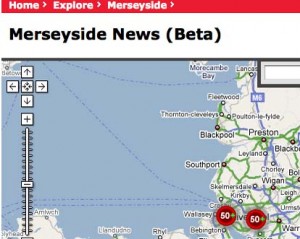
1) Who are you and what’s it all about?
I’m Ryan Sholin, I work at GateHouse Media in the US, I’m a graduate student at San Jose State University working on a degree in Mass Communications, and I’ve been blogging at ryansholin.com for three years now, mostly about the future of newspapers and journalism education.
The idea for ReportingOn came to me as I saw more and more tools for journalists to share what they were reading, but very few to share what they were writing.
I’m all for aggregating links and social bookmarking – I use Google Reader, Delicious, and even Twitter as my filters for the onslaught of information and news out there on the Web – but I saw two key connections left to be made.
The first connection links reporters with a common beat to one another. If I’m reporting on local alternative energy start-ups in Silicon Valley, and you’re reporting on local alternative energy start-ups in Boston, we could mutually benefit from sharing angles and ideas.
The second connection links readers with beat reporters. If readers find themselves wishing for more reporting on local alternative energy start-ups in general, there should be a place to express that.
So I call ReportingOn “the backchannel for your beat.”
This isn’t about the craft of journalism – this is about the nuts and bolts of finding angles, sources, and data to bolster local news reporting.
2) Why would this be useful to a journalist?
Sometimes in newsrooms, we find ourselves isolated from the rest of the journalism world. Our local peers are often the competition. When we meet up with colleagues from out of town, it’s at conferences or email lists or websites based on methods and craft, but rarely actual reporting.
ReportingOn will give journalists an easy way to connect with others working the same beat across the state or across the continent.
3) Is this it, or is there more to come?
Oh, there’s more to come.
What’s live right now is a simple script that ties into Twitter. Anyone with a Twitter ID can send a tweet to reportingon (@reportingon in Twitter parlance) and it will show up at reportingon.com and in the reportingon Twitter stream.
The next step will be a site, most likely built in Drupal, where any journalist can sign up and post short updates that answer the question “What are you reporting on?”
The fun part is surfacing the replies in a way that makes it easy to find your peers. The taxonomy system in a CMS like Drupal makes it simple to surface, for example, all the posts about alternative energy. Meeting pods are essentially a little room within a room. They are primarily used for meetings, hence the name, but can be used for all kinds of purposes. These meeting pods come in all shapes and sizes to meet different needs. Pods can be open like the office itself or closed off for privacy and confidentiality. Closed pods are more beneficial because of their natural soundproofing. Open pods still have some basic level of soundproofing, so people can still hold private conversations. privacy phone booth
So imagine a site where the front page has a few lists: recent posts, recent topics, and popular topics.
The ‘popular topics’ list might have entries like: “231 journalists are reporting on alternative energy”. Clicking on 231 gets you a list of the journalists; clicking on alternative energy takes you to the page where everything posted about alternative energy is aggregated.
A second piece of the site will allow “readers” to vote on what topics they would like to see more … reporting on.
Once the site is built and users are showing up, I could see adding a Facebook application that would let users display recent posts from the topic of their choice on their Facebook profile.
4) Why are you doing this?
I saw a need to connect reporters to each other. So much local news lacks context, lacks a clear idea of where a local event fits into a larger trend, whether we’re talking about drunken driving or school funding or foreclosures.
Twitter has been a big inspiration, as well. I’ve been impressed at how casual, public conversation can be packed with information and benefit to anyone willing to ask questions and give answers freely.
Plus, I’m planning to launch the next stage of ReportingOn as a part of the requirements to finish my graduate degree.
5) What does it cost to use it?
Absolutely nothing.
6) How will you make it pay?
This is a non-profit endeavour as far as I’m concerned. That said, I’m actively looking for grants to help with server costs, advertising, and promotion.

